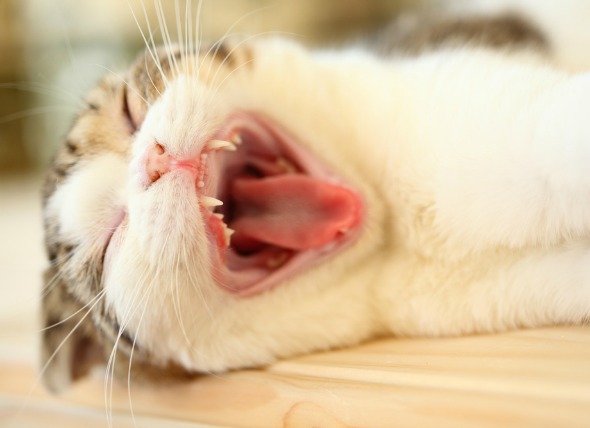
Hyperphosphatemia is an electrolyte disturbance in which abnormally elevated levels of phosphate are present in the cat's blood. It can occur at any age but is more common in kittens or old cats with kidney problems. Additionally, cats with bone diseases and calcium deficiency are susceptible to hyperphosphatemia.
Hyperphosphatemia can affect both dogs and cats. If you would like to learn more about how the condition affects dogs, please visit this page in the PetMD health library.
Although there are no specific signs directly attributable to the condition, symptoms will depend on the underlying cause of hyperphosphatemia. In acute cases, painful muscular spasms and tremors may be seen due to low levels of calcium.
Vast quantities of phosphorous are located in the bones and teeth, bonded with calcium. Therefore, bone diseases or problems such as bone resorption can cause excessive phosphates to be released in the cat's bloodstream. Other underlying factors for hyperphosphatemia include:
As no particular symptom is related to this condition, most cases are diagnosed with routine laboratory testing such as complete blood count, biochemistry profile, and urinalysis (which should show abnormally elevated levels of phosphate). Additionally, bone X-rays are performed to rule out any potential bone diseases or maladies.
X-rays are also used to evaluate the size and symmetry of kidneys, which will help the veterinarian identify abnormalities related to the disease. Calcium levels, meanwhile, are frequently found to be abnormally elevated (hypercalcemia), although in some cases the levels are abnormally low (hypocalcemia), as in vitamin D intoxication.
In case of diseases related to thyroid gland, your veterinarian may also conduct tests to evaluate thyroid gland functions and hormone levels for diagnosis.
Hyperphosphatemia should be considered a medical emergency, requiring immediate treatment of the underlying cause. Your veterinarian will begin by administering fluid therapy to correct electrolyte imbalances. In some cases, certain chemicals with the ability to bind to phosphorous (e.g., aluminum hydroxide) are also administered.
Laboratory testing, meanwhile, is conducted during and after treatment to evaluate the levels of phosphorous and other vital electrolytes.
In addition to regularly monitoring the cat's phosphorous levels, your veterinarian will restrict phosphorous-rich diets. It is important to follow your veterinarian's guidelines to prevent excessive levels of phosphorous to build up.
Prognosis in patients without any underlying disease is excellent with initial treatment, whereas cats suffering from an underlying disease require treatment to prevent recurrence.
 Excessive Vocalization in Cats
Disruptive Crying and Meowing in Cats
Excessive v
Excessive Vocalization in Cats
Disruptive Crying and Meowing in Cats
Excessive v
 Advil Poisoning in Cats
Ibuprofen Toxicity in Cats
Ibuprofen is a non-ste
Advil Poisoning in Cats
Ibuprofen Toxicity in Cats
Ibuprofen is a non-ste
 Inflammation of the Pancreas in Cats
Pancreatitis in Cats
The pancreas is part of the
Inflammation of the Pancreas in Cats
Pancreatitis in Cats
The pancreas is part of the
 Collection of Fluid in the Lungs (Not Due to Heart Disease) in Cats
Noncardiogenic Pulmonary Edema in Cats
Noncardiog
Collection of Fluid in the Lungs (Not Due to Heart Disease) in Cats
Noncardiogenic Pulmonary Edema in Cats
Noncardiog
 Mouth Cancer (Gingiva Squamous Cell Carcinoma) in Cats
Gingival Squamous Cell Carcinoma in Cats
Carcinom
Mouth Cancer (Gingiva Squamous Cell Carcinoma) in Cats
Gingival Squamous Cell Carcinoma in Cats
Carcinom
Copyright © 2005-2016 Pet Information All Rights Reserved
Contact us: www162date@outlook.com